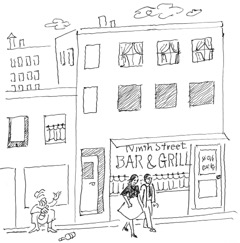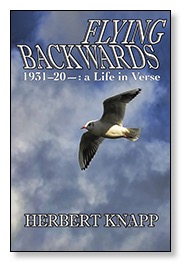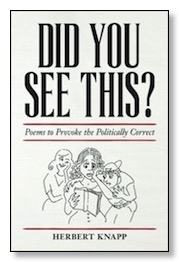FROM FLYING BACKWARDS, 1931-20—: A LIFE IN VERSE
Even when I told myself my life was just one damn thing after another, I somehow knew there was a story to it. I just didn’t know where to find it. I wrote this memoir hoping to do so.
But why should you read it? That, I cannot say. But I know why I read memoirs. As I’ve grown older I’ve become more interested in truth than art. I know, of course, that memoirs aren’t entirely true. We dramatize our memories. Or we simply don’t remember what happened accurately. And it is paradoxically true that without art we would never get to the truth of many things. Nevertheless, the fact that the author of a memoir claims it’s true gives his work a different “feel.” I read it a different way from the way I read fiction. And, yes, I’m just plain curious about other people’s lives.
This memoir is different in that it’s written in conversational verse. I did not do this because I think of myself as “a poet,” nor because I think my life is poetic. I did it because it would have been harder for me to write it in prose. Prose tempts me to digress. Verse forces me to focus.
Since I am not a politician, a movie star, a criminal, or a victim, my memoir contains no lurid revelations. Nor is it a narrative that zips people and events together the way Vikram Seth did in his .verse novel The Golden Gate (1986). The poems in my memoir are more like buttons holding a shirt together. There are gaps. But the story they hold together is not only understandable, it is illustrated by my drawings. The poems range from descriptions of actual people
I AM NOT MAKING THIS UP, 1936
bent down to speak to me, she made me wince.
Gigantic earrings framed her weathered face
I daydreamed that detectives would arrest her.
To my surprise she left at mid-semester.
But then, alas, Miss Lemon took her place.
to longer poems about experiences and relationships that altered my ideas and attitudes. This is a poem about our first apartment. Mary found this place. She knew about the bar, of course, but had no idea the second floor was a bordello, or that the convenience store across the street was a front for a small casino. We were so-ooo naive and innocent! But the drunks and the whores and the wiseguys were very nice to us.

POLITENESS, 1953
and bigotry was like the weather. Yes,
but every age is dark. We were polite
and wandered safely through the park at night.
“We know best. Take our advice. You must
think of the future. Stop!” our parents cried.
The years lay flat, waiting to be mowed.
Sculptured lawns smelled of insecticide.
“Face the facts,” they urged. We said we were.
No money. So, no car, TV, or phone.
No newspaper. We had a radio.
They groaned but left us pretty much alone.
We lived in rooms two floors above a bar—
close to our jobs but far from our parents’ dreams.
The view from our two windows was into
The giant windows of a factory.
where faded women fitted rags to pipes
then worked a lever causing them to swell
to Teddy bears that would in children’s arms
be charmed into an almost kind of life.
Our mothers stuffed us. Were we eating right?
They couldn’t see, they said, where we were heading.
Nor could we but were content to be
wise in our own eyes and out of sight.
We were sure that greatness soon would fall
into our laps, confounding those who were
predicting less delightful things for us,
but meanwhile we accepted drinks in bars
from strangers who would wave. I stayed up late
to write. My style was touch-me-not. I wrote
of things I could not wait to understand,
demanding words make sense at my command.
Your style was Davidow. You didn’t write.
But you created, swelling with the weight
of someone out of sight. So it was you
who grew so quickly unobscurely great.
Fists at midnight banged our door, and boisterous
voices, suddenly abashed when I
appeared, would say, “’Scuse us, we’re looking for . . .”
And I would say, “Downstairs,” and close the door.
Both apartments on the second floor
were rented to the so-called “Spanish girls.”
When one of them came out as we went by,
we saw a maze of beds inside. So, “Hi,”
we said. She turned away without replying.
Guys heard, “Second floor above the bar,”
and came a floor too far. Across the street
there was a grocery run by George the Greek.
“Post Toasties, please,” I said, and bettors heading
back to the back room grinned and stopped to watch
as George worked free a box that had grown roots.
Who could believe in us? But we delivered
life to that neighborhood. A drunk lurched up
to take your arm and help you cross the street.
A whore just coming out our building’s door
to go to work as you were coming home
stepped back and held it for you. “Thanks,” you said,
and started up the narrow stairs we shared
but didn’t hear it close. You felt her stare
and turned to face the fact that there are times
when things have gone too far to be made right—
when nothing can be done but be polite.
She turned to go, was stepping out of sight,
when you called down the stairs to her, “Goodnight.”
FLYING BACKWARDS also contains poems about a few of those “spots of time” by which “our minds / Are nourished and invisibly repaired.”
JANUARY 1. 2017
translating now to long ago,
you joined me there but did not say a word.
We shared a poem neither read nor heard.


